How often do you brush your pet’s teeth? If you’re like most, your schedule makes it nearly impossible to brush your pet’s teeth daily, as recommended by veterinarians. As busy pet owners ourselves, we completely understand, so we’ve come up with easier, but still efficient, ways to keep your furry friend’s pearly whites gleaming! While properly cleaning your pet’s teeth with a toothbrush is the best option and we do recommend you try to fit it into your schedule if possible, there are other ways to help them maintain good oral hygiene!
Dental Chews
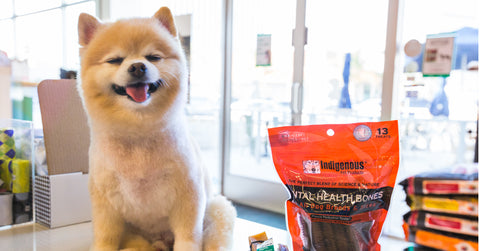
Pets were meant to chew, gnaw, and rip! Dental chews prevent plaque from turning into something more serious, like tarter, by isolating calcium on their teeth. Animal Planet explains if plaque is untreated for 36 hours, it turns into tarter and can potentially lead to painful, inflamed gums. However, with the use of dental chews, it makes it easier to scrape plaque and bacteria off their teeth while they enjoy their special treat.
By preventing plaque and bacteria build-up, you are also helping your pet stay away from bad breath! Great dental chews are Indigenous Dental Health Bones, which help clean and freshen breath, while fighting plaque and tartar build-up. These chews are made with a natural kelp rich in nutrients and free from artificial colors and preservatives. Give them a try today!
Raw Bones
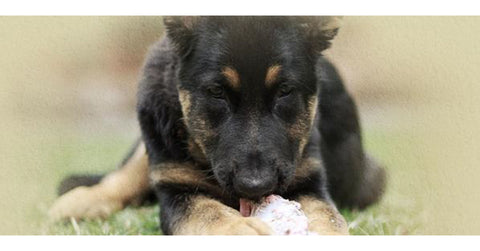
Raw Bones are a great source of minerals and other nutrients that can be given as a treat or a meal. In addition to the fact that they satisfy your pets’ natural cravings, they also help to keep their teeth clean. The cartilage and soft tissue meat still attached to raw bones acts like floss in their mouths, polishing and scraping away tartar as your pup enjoys their treat. Honest Kitchen also explains that when your pet chews on a raw bone, it helps stimulate saliva enzymes when given after a meal, and that all they need is ten to fifteen minutes to remove trapped food particles from their teeth. Learn more about the benefits of feeding raw on our Rawnivore page!
Toys
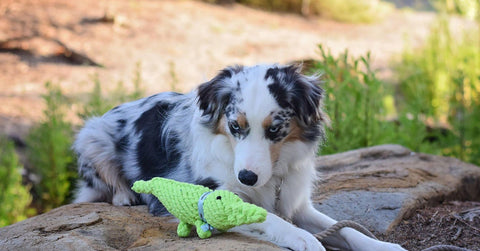
What better way to keep your pet’s teeth shining than with playtime? Like dental chews, certain toys can also help keep teeth clean and tarter free. They slow dental disease with their abrasive action that scrape plaque buildup, while simultaneously massaging your pet’s gums. Their rubber and other synthetic materials offer a bumpy surface our pets are drawn to, which satisfies their chewing urges.
Looking for the perfect dental toy? Check out Good Karma Rope Dog Toys by Jax & Bones! These rope toys are made with non-toxic vegetable dyes that fray and act like dental floss the more your pet chews on them. Not only are these toys good for your pet’s health, but they also donate 10% of their proceeds to rescue and animal welfare groups!
Raw Food
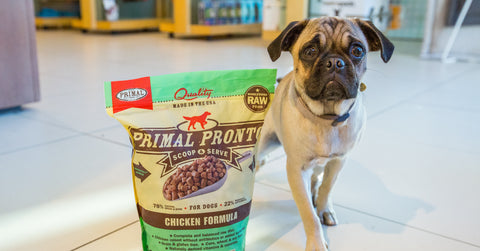
Don’t fall for the myth about kibble cleaning pet’s teeth – go natural! Allow your furry friend to use their chompers the way they were designed to with raw food. Dogs Naturally explains that raw meat contains enzymes that break down food material, as well as bones that keep plaque and tarter from building up in your pet’s mouth. A raw diet doesn’t contain unnatural and damaging starches and sugars, which can greatly affect the bacteria growth in your pet’s mouths. Want to start feeding raw? Check out these tips to make feeding raw food easier!
ProDen PlaqueOff Powder
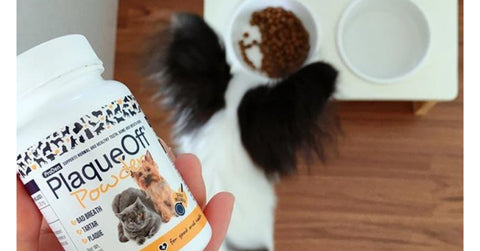
Looking for something that works from the inside out? ProDen PlaqueOff Powder is ingested and integrated into your pet’s saliva to break down the bacterial biofilm that forms on the teeth and gums. It helps reduce plaque and tarter, as well as prevent bad breath and bacteria from returning. This is an all-natural powder created from a specific strain of selected seaweed harvested in Scandinavia. It has developed a natural defensive mechanism against bacterial biofilm and has proven to work within two to three weeks! Simply add it to your pet’s everyday meals and start seeing the natural difference!
Parsley
Have a pet with bad breath? Try parsley! This herb contains vitamin A, C, folic acid, and other antioxidants that make it antimicrobial and effective in preventing bacteria. You can give it to your pet fresh and finely chopped with their meals one to two times per week. This is a quick way to get rid of bad breath, but remember that bad odor stems from poor dental health. Along with parsley, make sure you’re adding another daily routine to help reduce plaque and tarter from building up.
Oral Gel
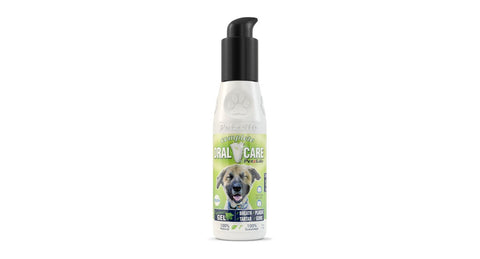
If you’re looking for something easy, an oral gel is the right way to go! Oral gels help eliminate plaque, remove tarter, reverse gum disease, and freshen breath with an ease of a pump. If you’re looking for an innovative and natural solution, try Petzlife Oral Care Gel! This oral gel is made from natural herbs, such as grapefruit seed extract. This herb is a natural alternative to strong antibiotics and helps fight infections caused by parasites, viruses, bacteria, and fungus.
To use, simply pump onto your hand and rub along your pet’s teeth and gum line. You can also squeeze some out on a toothbrush and brush your pet’s teeth with it! We love this gel because it can be used in two ways, to remove buildup and to prevent! To remove buildup, apply twice daily until you notice that plaque and tarter has dissolved. To prevent, you can use it two to three times per week. Whether you’re trying to prevent or remove the problem, this multitasking product will work wonders!
We understand how difficult it is to make time and have the patience to clean a pet’s mouth. Even if you incorporate parsley, toys, dental chews, and more to your pet’s everyday life, you won’t see the same results as teeth brushing. Along with brushing their teeth, you can use the products mentioned above to help maintain a cleaner and healthier mouth. Don’t wait until problems arise, start working towards a healthy mouth for your pet now! Stop by your local Healthy Spot and stock up on dental-rich products today!
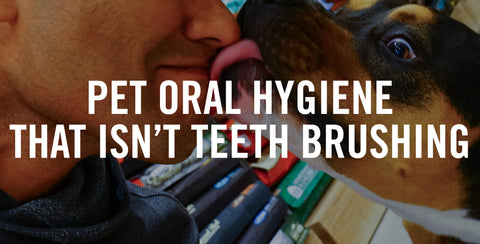

Comments (2)
Hello Tara,
Thank you for your question! The Primal frozen raw bones that we carry in store are safe for your dog! They are very nutrient dense though, so you may not want to give all in one sitting.
What raw bones are safe to give my small/medium size dog?